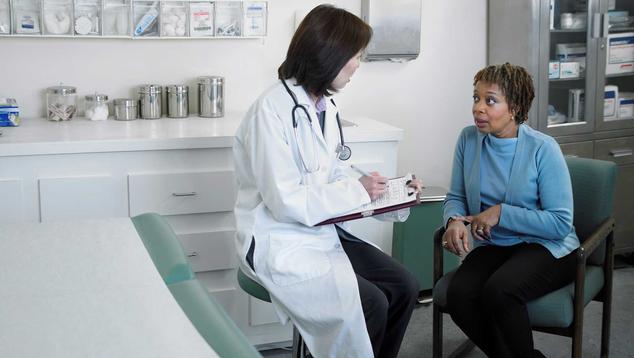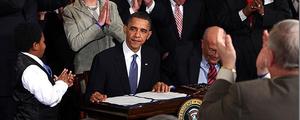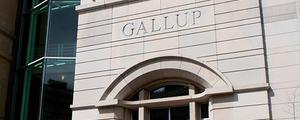Story Highlights
- 67% satisfied with what they pay for health insurance
- New low report health insurance costs have increased in past year
- Satisfaction with healthcare coverage also at a high point
WASHINGTON, D.C. -- As 2020 comes to a close, Americans' assessments of their healthcare are generally elevated, including record levels rating their healthcare coverage positively and feeling satisfied with their healthcare costs. A record-low percentage say their healthcare costs went up this year. Relatedly, the lowest percentage Gallup has measured in over a decade say they put off medical care this year specifically because of the cost they would have to pay.
Meanwhile, Americans' views of U.S. healthcare in general are largely unchanged, as the slight majority continue to rate its quality positively. Nearly four in 10 say the same of U.S. healthcare coverage. Even fewer are satisfied with the costs of healthcare in the country, but the 30% who are satisfied is the highest in Gallup's trend since 1993.
Americans' Positivity About Own Healthcare Costs Highest in 20 Years
The majority of Americans have consistently been satisfied with the total cost they pay for healthcare since Gallup first asked the question in 2001. But the 67% expressing satisfaction this year is the highest measured to date and up six percentage points from last year.

Line graph. A new high of 67% of U.S. adults are satisfied with the total cost they pay for healthcare. That is up from 61% a year ago and 58% in 2018. The prior high was 64% in 2001, and the low is 54% in 2006.
Compared with last year, younger adults -- those under age 50 -- are much more likely to be satisfied with their healthcare costs (66% today versus 53%). Older adults are typically more satisfied with their costs, but there has been no change in their satisfaction this year (69%) versus last (70%).
Increased satisfaction is also more apparent among those with private health insurance plans (63%, up from 55%). Americans who have no insurance or government insurance plans show smaller but not statistically meaningful increases.
The vast majority of those who have a private health insurance plan, 89%, report they pay all or part of the total cost of the plan. Of these, 55% report the amount they pay for their family's health insurance has gone up in the past year, while 36% say it has not changed and 8% gone down. The 55% paying more is 11 points lower than Gallup has measured in any prior survey, with the prior lows occurring in the previous two most recent measures, in 2017 and 2018.

Line graph. Fifty-five percent of adults with private insurance plans who pay at least part of their premiums say their healthcare costs have gone up in the past year, the lowest measured to date. As recently as 2015, 74% said their costs had gone up.
Fewer Americans Delaying Medical Treatment Because of Cost
Gallup has also tracked Americans' reports of delaying medical treatment because of the cost since 2001. Twenty-six percent say they or a member of their family has put off treatment, down seven points since last year and the lowest Gallup has measured since 2004. Before that year, no more than one in four had ever reported delaying care because of cost.

Line graph. 26% of Americans say they put off medical treatment in the past year because of the cost. That is the lowest since 2004, and down from the high point of 33% a year ago.
As would be expected, the decline in the percentage putting off medical treatment is most apparent among lower-income Americans, who are generally most likely to do so. This year, 33% of those living in households with annual incomes of less than $40,000 put off medical treatment, down from 43% last year. Meanwhile, 28% of those with annual household incomes of $40,000 to $99,999 delayed treatment (down from 33% in 2019), as did 17% of those in upper-income households (down from 21%).
As has typically been the case, especially in recent years, more U.S. adults said they put off treatment for a serious medical condition (17%) than one that was not serious (9%).
Ratings of Americans' Healthcare Coverage, Quality Among the Best to Date
Americans have generally been quite positive about their healthcare coverage and quality, and their assessments of these aspects of their healthcare have not varied much in the 20 years that Gallup has measured them.
Still, the 74% who rate their healthcare coverage as excellent or good this year is the highest measured to date, albeit only two points higher than the previous high. The 82% who say their healthcare quality is excellent or good is one point below the trend's high point measured in 2007 and 2008. Both ratings edged up three points from last year.

Line graph. 82% of Americans today rate the quality of healthcare they receive as excellent or good. Since 2001, the percentage giving these ratings has ranged from 76% in 2015 and 2016 to 83% in 2007 and 2008. This year, 74% rate their healthcare coverage as excellent or good, the highest measured to date. The low point was 63% in 2005, and the previous high was 72% in 2011.
Quality and coverage ratings are highest among those aged 65 and over, most of whom are on Medicare, and upper-income Americans.
Satisfaction With U.S. Healthcare Costs Also at New High
Americans are much more critical of healthcare costs in the U.S. than they are of their own costs. Still, this year a new high of 30% are satisfied with the cost of healthcare in the U.S., while 69% are dissatisfied.
Satisfaction with U.S. healthcare is up from 26% in 2019 and 20% in 2018. The prior high was 28% in 2001, while the low point was the 8% measured in the early part of Bill Clinton's administration in 1993.

Line graph. Thirty percent of Americans are satisfied with the total cost of healthcare in the U.S., the highest to date.
The increase in satisfaction this year is driven primarily by Republicans (including Republican-leaning independents), among whom 44% are satisfied, up from 26% two years ago. Currently, 16% of Democrats and Democratic leaners are satisfied, little changed over that time span.
Satisfaction with U.S. healthcare costs has become tied more to the party of the president since the Affordable Care Act was passed in 2010, particularly after the healthcare exchanges opened in 2013. At that point, Democrats' satisfaction increased and Republicans' decreased. A notable party gap lasted throughout the remainder of President Barack Obama's term, and it flipped once President Donald Trump took office.
Republicans were consistently more likely than Democrats to be satisfied with healthcare costs throughout the George W. Bush administration and in the early years of the Obama presidency.

Line graph. Satisfaction with the total cost of healthcare in the U.S. among Republicans and Republican-leaning independents and Democrats and Democratic-leaning independents since 2001. Currently, a record-high 44% of Republicans, as well as 16% of Democrats, are satisfied.
Republicans (74%) are also more likely than Democrats (62%) to say they are satisfied with their own healthcare costs.
Americans Rate Quality and Coverage of U.S. Healthcare Lower Than Their Own
Just as U.S. adults are more satisfied with the cost of their own healthcare than they are with healthcare costs in the U.S. more generally, so too are they more likely to rate the quality and coverage of their own healthcare than that of the U.S. positively. Americans' rating of the quality of U.S. healthcare as excellent or good is 28 points lower than their rating of their own, and their view of coverage in the U.S. is 36 points lower than their own.
The 54% who say the quality of healthcare in the U.S. is excellent or good is consistent with recent readings and well below the 62% high last seen in 2012. The 38% rating U.S. coverage positively marks a slight improvement from recent years and is close to the 2012 record high of 41%.

Line graph. Americans' ratings of the quality and coverage of healthcare in the U.S. since 2001. Currently, 54% of Americans say the quality is excellent or good, and 38% say the same of coverage.
Older Americans, those with annual household incomes of $100,000 or more, and Republicans and Republican-leaning independents are more likely than their counterparts to rate the quality and coverage of healthcare in the U.S. as excellent or good.
Bottom Line
Americans' views of their own healthcare are largely positive, including the cost, quality and coverage they receive. Fewer than in the recent past say they have put off medical treatment this year because of cost, and they are less likely than at any point in the past 20 years to say the amount they pay for healthcare has gone up this year. The coronavirus situation may be a contributing factor, perhaps because people are seeking less medical treatment than in the past, and are therefore paying less.
Their views of the quality, coverage and costs of healthcare in the U.S. in general fall well short of their own but are at least modestly improved from last year. This comes at a time when Americans' confidence in the medical system showed one of the largest increases for any institution in four decades.
View complete question responses and trends (PDF download).
Learn more about how the Gallup Poll Social Series works.




